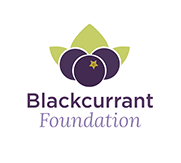Cardiovascular Health
A high intake of fruit and vegetables has been linked to a reduced risk of heart disease. For example, it is well-known that the flavonoid-rich diet of the French, who drink a lot of red wine, is good for you (1, 2, 3). Blackcurrants are a natural, readily available and rich source of flavonoids.
How do flavonoids reduce the risk of cardiovascular disease?
Eating foods and drinks that are rich in flavonoids can benefit the cardiovascular system in a number of ways. Studies have shown that drinking wine or juices rich in flavonoids helps to improve the function of your blood vessels (4, 5, 6). Scientists have also shown that flavonoids can reduce blood stickiness in both laboratory tests (7) and in humans (8, 9). This means reducing the chance of forming small blood clots which can injure the blood vessel lining and stop them working.
As well as stopoing blood vessels working properly, small blood clots release harmful chemicals that can increase the formation of bad cholesterol (also known as oxidised low density lipoprotein), which sticks to the blood vessel walls. Eventually, this can lead to a narrowing of the arteries, which will prevent the blood flowing around the body efficiently and could lead to increased blood pressure.
What scientific evidence is there?

Laboratory tests have found that flavonoids reduce the rate at which bad cholesterol is formed (10, 11). Whilst some volunteer studies have shown that this occurs in the body after people have consumed wine or juices rich in flavonoids (12, 13, 14), not all studies have shown this effect.
When a mixture of blackcurrants, lingonberries and bilberries were eaten by 20 men in Finland, scientists observed that the rate of bad cholesterol formation was slightly reduced (15). In another study, blackcurrant juice helped the function of blood vessels in rats (16).
A further study has shown improved blood flow in the forearm after consumption of blackcurrant anthocyanins. This also led to some reduction in shoulder muscle stiffness after a typing exercise (17).
However, more studies are required to confirm these benefits for blackcurrants.
Are scientists doing any more research to prove this?
A feeding study will try and find out just how protective blackcurrants are against heart disease (blueberry and water will also be consumed as experimental controls).
The study will be run by Dr D Stewart, SCRI, and Professor Jill Belch, University of Dundee Medical School, and sponsored by Chest, Heart and Stroke Scotland.
References
- Knekt P, Jarvinen R, Reunanen A, Maatela J.: Flavanoid intake and coronary mortality in Finland: a cohort study. BMJ. 1996; 312: 478-481
- Hertog MG, Feskens EJ, Hollman PC, Katan MB, Kromhout D: Dietary antioxidant flavonoids and risk of coronary heart disease: the Zutphen Elderly Study. Lancet: 1993; 342:1007-1011
- Hertog MD, Kromhout D, Aravanis C et al. Flavonoid intake and long term risk of coronary heart disease and cancer in the seven countries study. Arch Intern Med 1995; 155: 381-386
- Estruch R. Wine and cardiovascular disease. Food Research International 2000 33:219-226
- Stein JH, Keevil JG, Wiebe DA, Aeschlimann S, Folts JD. Purple grape juice improves endothelial function and reduces susceptibility of LDL cholesterol to oxidation in patients with coronary artery disease. Circulation 1999; 100:1050-1055
- WilsonT, Weise C, Porcari J, Backes RJ, White-Kube R. Effect of cranberry juice consumption on blood flow in the arm. FASEB Journal 2002 16(4): A239
- Freedman JE, Parker C, Li L, Perlman JA, Frei B, Ivanov V, Deak LR, Iafrati MD, Folts JD. Select flavonoids and whole juice from purple grapes inhibit platelet function and enhance nitric oxide release. Circulation 2001 103: 2792-2798
- Keevil JG, Osman HE, Reed JD, Folts JD. Grape Juice, but not orange juice or grapefruit juice, inhibits human platelet aggregation. J. Nutr. 2000; 130: 53-56
- Wilson T, Marley JC. Effects of cranberry juice consumption on platelet aggregation. FASEB Journal 2001 15(4) A286
- Frankel EN, Bosanek CA, Meyer AS, Silliman K, Kirk LL. Commercial grape juices inhibit the in vitro oxidation of human low-denisty lipoproteins. J. Agric. Food Chem. 1998 46: 834-838
- Miyagi Y, Miwa K, Inoue H. Inhibition of human low-density lipoprotein oxidation by flavonoids in red wine and grape juice. Am. J Cardiol. 1997 80:1627-1631
- Estruch R. Wine and cardiovascular disease. Food Research International 2000 33:219-226
- Nigdikar SV, Williams NR, Griffin BA, Howard AN. Consumption of red wine polyphenols reduces the susceptibility of low density lipoproteins to oxidation in vivo. Am J Clin Nutr 1998 68:258-265
- Avriam M, Rosenbalt M, Gaitini D, Nitecki S, Hoffman A, Dornfield L, Volkova N, Presser D, Attias J, Liker H, Hayek T. Pomegranite juice consumption for 3 years by patients with carotid artery stenosis reduces common carotid intima-media thickness, blood pressure and LDL oxidation. Clin Nutr. 2004 23: 423-433
- Marniemi J, Hakala P, Maki J and Ahotupa M. Partial resistance of low density lipoprotein to oxidation in vivo after increased intake of berries. Nutr Metab Cardiovasc Dis. 2000 10: 331-337
- Yuko N, Hitoshi M, Kazuo T. Endothelium-dependent vasorelaxation induced by blackcurrant concentrate in rat thoracic aorta. Japanese Journal of Pharmacology 2002 89: 29-35
- Matsumoto et al (2004) Effects of blackcurrant anthocyanin intake on peripheral muscle circulation during typing work in humans. Eur. J. Appl. Physiol.
YOU MAY ALSO WANT TO READ
Reducing Erectile Dysfunction
Scientists have found that a diet rich in flavonoids, natural compounds found in fruit and vegetables, could dramatically reduce the risk of erectile dysfunction.
read moreThe Natural Brain Boost
Ground-breaking research reveals that acute supplementation with blackcurrant extract can help to increase human cognitive function and performance.
read moreDigestion & Fighting Cancer
Research reveals that blackcurrants can help to promote healthy bacteria in the gut as well as having an ‘anti-tumour’ effect on some cancers.
read more

